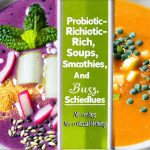Our gut health profoundly impacts overall well-being, influencing everything from digestion and immunity to mood and even mental clarity. In recent years, there’s been growing awareness about the importance of nurturing our gut microbiome – the trillions of bacteria residing in our digestive system. While dietary changes like incorporating more fiber and fermented foods are crucial, sometimes a quick and convenient boost is needed. Smoothies offer an excellent way to deliver targeted nutrients that support a healthy gut, making them a delicious and effective addition to any wellness routine. This article will explore how specific ingredients can transform your daily smoothie into a powerful tool for gut health, offering recipes and guidance to get you started on the path towards a happier, healthier digestive system.
The beauty of smoothies lies in their versatility. You can tailor them to your individual needs and preferences, incorporating ingredients that address specific concerns or deficiencies. It’s not just about throwing fruits and vegetables into a blender; it’s about understanding why certain combinations work so well for gut health, and how you can optimize your smoothie for maximum benefit. Let’s delve into the key components that make a smoothie truly gut-supportive.
Building a Gut-Friendly Smoothie Base
The foundation of any great smoothie starts with a liquid base. Water is always a good option, but consider incorporating gut-friendly liquids like kefir or unsweetened almond milk. Kefir, a fermented dairy product (or non-dairy alternative), is packed with probiotics – beneficial bacteria that populate the gut and aid digestion. Almond milk provides a creamy texture without the lactose found in cow’s milk, which can be problematic for some individuals. Beyond the liquid itself, think about adding healthy fats like avocado or coconut oil. These fats not only enhance the smoothie’s texture but also support nutrient absorption and overall digestive health.
Fiber is another essential component of a gut-friendly base. Flaxseeds and chia seeds are fantastic sources of soluble fiber, which feeds beneficial bacteria in the gut and promotes regularity. A small amount goes a long way – start with a teaspoon or two to avoid any digestive discomfort. Remember that introducing too much fiber too quickly can sometimes cause bloating or gas, so gradual incorporation is key. Finally, don’t underestimate the power of greens! Spinach, kale, or even romaine lettuce blend seamlessly into smoothies and provide vital vitamins, minerals, and antioxidants that support gut health.
Key Ingredients for Gut Healing & Support
Beyond the base, certain ingredients are particularly potent when it comes to supporting a healthy gut microbiome. Ginger is well-known for its anti-inflammatory properties and can help soothe digestive upset. Turmeric contains curcumin, another powerful anti-inflammatory compound that has been linked to improved gut health. Berries – blueberries, raspberries, strawberries – are rich in antioxidants and fiber, providing nourishment for beneficial bacteria. Bananas offer prebiotic fibers, which act as food for probiotics, helping them thrive.
Consider incorporating fermented foods directly into your smoothie, if you enjoy the taste! A spoonful of yogurt or sauerkraut (yes, really!) can deliver a concentrated dose of probiotics. If you’re hesitant about the flavor, start with very small amounts and gradually increase as tolerated. Pineapple contains bromelain, an enzyme that aids in protein digestion and reduces inflammation. And lastly, don’t forget about prebiotics – foods that feed your gut bacteria. Onions, garlic, asparagus, and bananas are all excellent sources of prebiotic fibers.
The Role of Probiotics & Prebiotics
Probiotics are live microorganisms that, when consumed in adequate amounts, confer a health benefit on the host. They help restore balance to the gut microbiome, improving digestion, boosting immunity, and even influencing mood. While probiotic supplements are available, incorporating probiotic-rich foods like kefir or yogurt into your smoothies is a natural and effective way to increase your intake.
Prebiotics, on the other hand, are non-digestible fibers that serve as food for probiotics. They help beneficial bacteria flourish, creating a thriving gut ecosystem. Think of it as tending a garden – you need to nourish the plants (probiotics) with the right fuel (prebiotics) for them to grow and thrive. A diet rich in both probiotics and prebiotics is essential for optimal gut health. Combining ingredients like banana (prebiotic) and kefir (probiotic) in your smoothie creates a synergistic effect, maximizing the benefits for your digestive system.
Smoothie Recipes to Get You Started
Here are a couple of recipes to inspire your gut-supportive smoothie creations:
Berry Bliss Gut Booster: 1 cup unsweetened almond milk, ½ cup mixed berries (blueberries, raspberries, strawberries), 1 banana, 1 tbsp chia seeds, 1 tsp ginger grated, and a small handful of spinach. Blend until smooth.
Tropical Turmeric Tummy Soother: 1 cup kefir, ½ cup pineapple chunks, ¼ avocado, ½ tsp turmeric powder, pinch of black pepper (to enhance curcumin absorption), and a tablespoon of flaxseed meal. Blend until creamy.
These are just starting points – feel free to experiment with different ingredients and find what works best for you. Remember to listen to your body and adjust the recipes based on your individual needs and preferences.
Ultimately, incorporating gut-supportive smoothies into your routine is a simple yet powerful way to nurture your digestive health and unlock a wealth of benefits beyond just improved digestion. It’s about making conscious choices that nourish your microbiome and support overall well-being.


















